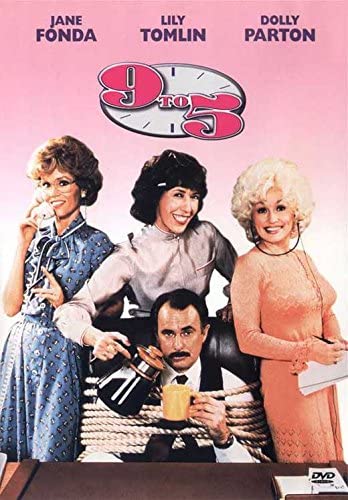9 to 5
Dolly Parton, 1980 |

 |
"What kind of work does Dolly Parton describe in this song? Clerical, low-paying, non-creative. What emotions come though? Frustration, anger, defiance. What mood does the music in this song convey? How? Rushed, hurried, like the workday. |
 |
What does she want from her job that she's not getting? Credit for ideas, promotion, getting paid well enough to save some money. |
 |
Where is the hope in this song? Dreams for the future. When she says her "ship'll come in" what do you think she means? Would she be satisfied hitting the lottery or is she hoping for something else? She doesn't complain about her work, but about being under-rewarded for her work. |
 |
What do you notice about gender in this song? Bosses and rich are all men. What is the "glass ceiling"? Hidden limit of how high women can advance. |
 |
What kinds of jobs do women still mostly hold? What kinds of jobs are still mostly denied to women? Why? How equally are women paid for the same work? In 2020 women earned 82.3% of what men earned for comparable work. |
 |
Is this song just about women, or do men feel like this, too? Why? |
 |
Compare this song to "Sixteen Tons," "Drill Ye Tarriers," "John Henry" and other work songs from earlier units. How does the work differ from the 9-to-5 clerical work this song describes? Hard manual labor vs. sitting at a desk. What is similar about their situations? Work to make someone else rich, not being able to advance, bosses "using us up." What similar emotions come through in these songs? Frustration, discouragement, anger. |
|
 "9 to 5" performed by Dolly Parton on Billboard Top Hits 1981, Santa Monica, CA: Rhino Records [R270676], © 1992. Available on iTunes, Spotify, and YouTube. "9 to 5" performed by Dolly Parton on Billboard Top Hits 1981, Santa Monica, CA: Rhino Records [R270676], © 1992. Available on iTunes, Spotify, and YouTube.
For more information on Dolly Parton, visit her official website. The official video may be viewed on YouTube. |

Rights have not been secured to reprint the words for this song. Please consult this
online source
http://www.dollyon-line.com/archives/lyrics/9to5.shtml
|
|

 |
| Movie poster for the film 9 to 5. |
Dolly Rebecca Parton was born in the mountain community of Locust Ridge, Tennessee, in 1946 and began singing in bluegrass bands before she was a teenager. After graduating from high school in 1964, she moved to Nashville, where she won recognition as a featured artist on Porter Wagoner’s nationally syndicated television show. Parton’s first Top-10 hit as a solo artist was Bill Monroe’s arrangement of “Muleskinner Blues” in 1970. Although she made many solo records, she and Wagoner also recorded many hit duets. In 1974 she left Wagoner to focus on her solo career, proving her talents time and again through hit records and motion picture and television roles. Strongly influenced by the “mountain” music she grew up around, Parton’s music features fiddles, banjos, mandolins, and guitars.
This song was composed for the movie of the same name, in which Parton had a lead role. It deals through humor with women trapped in secretarial positions.
|

Compare this song to:
"Drill Ye Tarriers" (Unit 5)
"John Henry" (Unit 5)
"Sixteen Tons" (Unit 8)
"I Am Woman" (Unit 8)
"Mountains O' Things" (this unit) |
|


